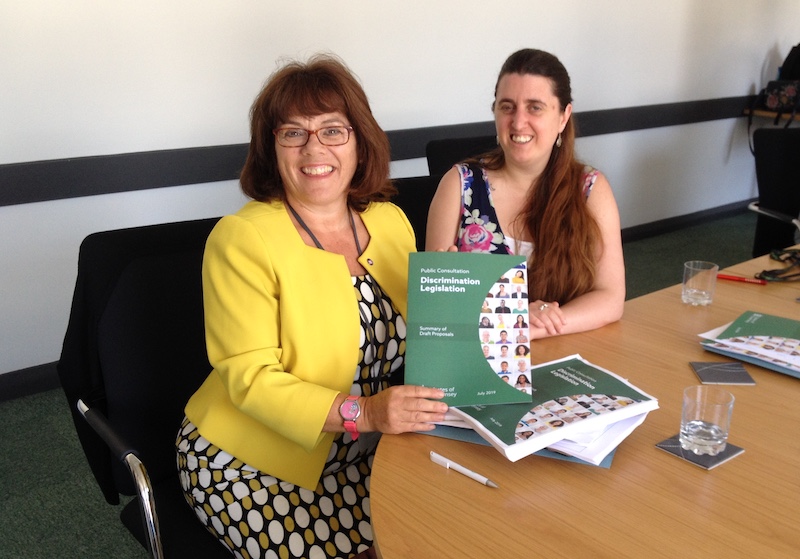


The Guernsey Disability Alliance is calling for an urgent meeting to discuss the proposed delay to Guernsey's anti-discrimination legislation.
Deputy Michelle Le Clerc told the States last week that the Committee for Employment and Social Security is going to look again at its proposals, before bringing them back to the States for debate.
The GDA says it needs to find out more so it can understand that decision and the situation better.

Pictured: Deputies Michelle Le Clerc and Emilie McSwiggan of the Committee for Employment and Social Security.
The GDA says it is particularly troubled by the suggestion that the proposed definition of disability may be changed, and by the proposal to row back on some of the proposed grounds of protection.
"We believe strongly that Employment, Social Security (ESS) must remain committed to the internationally agreed human rights approach to the protection from discrimination of persons with disabilities. Such an approach requires, amongst other principles, the elimination of discrimination on the basis of disability by any person, organisation or private enterprise and the ability to consider discrimination involving multiple and intersecting grounds," said the GDA.
The main problems with the anti discrimination proposals appear to come from some parts of the business community, who had previously asked for the public consultation on the matter to be extended. That was refused and the creation of the new legislation appeared to be progressing as planned. The GDA fears this delay is down to those concerns raised by the business community, but it is worried about what could now change.
"Some voices from within the business community have been calling for the States to adopt a medical model approach to disability," said the GDA in a statement. "Such an approach has a place when assessing need but has no place when judging eligibility to protection from discrimination. The medical model has been widely discredited by experts (including those experts who have been advising the States), as discriminatory, unhelpful, complex and likely to invite litigation. Moreover, such an approach would not comply with either the States’ Disability and Inclusion Strategy or with the Convention on the Rights of Persons with Disabilities, to which the States is committed.
"It is clear that some prominent figures in the business community have voiced concerns about the proposed definition of disability and about the cost to business of complying with the proposed provisions relating to disability. The costs have been grossly exaggerated, and the effects and application of the proposed definition have been misunderstood. These concerns ignore the experience of other jurisdictions and have been exacerbated by inaccurate and exaggerated coverage by some organs of the media."
The GDA does not believe any business leaders are wanting to discriminate and is urgently seeking clarity on what will now happen next.
"The idea that employers and suppliers of goods and services should be entitled to seek economic advantage by disregarding internationally agreed rights and protections is abhorrent and we simply do not believe most Guernsey businesses would subscribe to such ideas. Not only would this damage our international reputation but it would also fly in the face of all the evidence which shows that companies which respect human rights, diversity and principles of non-discrimination are more successful than those that do not.
"The GDA is urgently seeking clarity about the revised approach outlined in the States. We hope that our discussions with the States of Guernsey will focus on what is essential. While it may be expedient to get something “over the line”, it would be a disaster if, after more than ten years of preparing the ground, learning the lessons from other jurisdictions and seeking renowned expert advice, disabled people were once again fobbed off with a fudge, being told by others with little experience, less expertise and flawed understanding, what protections they must accept. Such an approach is likely to do more harm than good and will not comply with the policies and with the internationally agreed conventions the States are committed to."
Comments
Comments on this story express the views of the commentator only, not Bailiwick Publishing. We are unable to guarantee the accuracy of any of those comments.